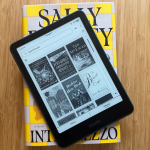Grace Dean/Insider
- I spent a day traveling round on the UK’s second-biggest Metro system in North East England.
- My $7.50 ticket included unlimited travel between all 60 stations, plus access to a ferry, too.
- Services weren’t as regular as the Tube, but it seemed cleaner and less crowded.
- See more stories on Insider’s business page.
Thomas Pallini/Insider
But not as many people know about the second biggest, the Tyne and Wear Metro, an overground and underground light rail system in the North East of England.
Grace Dean/Insider
Sources: The Railway Hub, Nexus
It transported its first passengers in 1980, and now has around 48 miles of track, making it just a fifth of the size of the Tube.
Grace Dean/Insider
Source: The Railway Hub, Nexus spokesperson
It connects the cities of Newcastle and Sunderland with other towns, the coast, and even an airport through a network of 60 stations.
Grace Dean/Insider
It’s really distinctive, too, with its vivid yellow and black color scheme that’s used for its trains, signs, and tickets.
Grace Dean/Insider
I decided to spend a day traveling round on the Metro to see how it stacks up to other urban public transport systems.
Grace Dean/Insider
I bought an Adult DaySaver. For just £5.40 ($7.50) this got me unlimited travel across the entire network – and access to a ferry.
Grace Dean/Insider
Unlike The Tube, both the track and the stations of the Tyne and Wear Metro are mainly overground.
Grace Dean/Insider
The underground parts are mainly parts right in the city centers.
Grace Dean/Insider
Like on other subway services, the underground stations have really long escalators to take you back to ground level.
Grace Dean/Insider
The Metro takes passengers over two rivers, the Wear and the Tyne. This is the Metro bridge that takes you over the Wear in Sunderland …
Grace Dean/Insider
… while the blue bridge in the foreground here takes you over the Tyne between Newcastle and Gateshead.
Owen Humphreys/PA Images via Getty Images
I enjoyed looking through the window on my journey …
Grace Dean/Insider
… including views of the cities from angles you don’t usually get to see.
Grace Dean/Insider
I got to see some pretty interesting stations, too. There was a really broad mix of styles.
Grace Dean/Insider
Some of the stations weren’t very exciting …
Grace Dean/Insider
… but three of the stations were located really close to sports stadiums. The Stadium of Light Metro station was painted in the colors of Sunderland Football Club …
Grace Dean/Insider
… while the St James station was themed around Newcastle United Football Club.
Callum Sawyers
Sunderland University had its own Metro station, too.
Grace Dean/Insider
One of the stops I got off at was South Shields, which lies at the mouth of the River Tyne, to take the ferry to North Shields.
Grace Dean/Insider
The ferry terminal was about a five-minute walk from the Metro station.
Grace Dean/Insider
The ferries run every 30 minutes in each direction, but luckily I arrived just as one was about to leave.
Grace Dean/Insider
The journey only took seven minutes. In the car it’s about 20 minutes because you have to drive further inland to the nearest bridge to cross the Tyne.
Grace Dean/Insider
I enjoyed the journey, though it did make me a little seasick. There was loads of seating and most of it had great views thanks to the big windows on all sides.
Grace Dean/Insider
Travel on the ferry is included with both single and DaySaver all-zone Metro tickets. But you can also buy a single ticket just for the ferry for £1.90 ($2.60).
Grace Dean/Insider
Source: Nexus
Like in South Shields, there was a walk of around five minutes from the ferry terminal to North Shields Metro station for the next leg of the journey.
Grace Dean/Insider
The Metro carriages were surprisingly clean for public transport. Though there were no trash cans onboard, the only litter I really spotted was old newspapers people had left on the seats for other travelers.
Grace Dean/Insider
I took my trip during the morning and early afternoon of a Tuesday during the school vacation. There weren’t many other passengers …
Grace Dean/Insider
… though it picked up a bit at around lunchtime.
Grace Dean/Insider
Nexus, which operates the Tyne and Wear Metro, mandates that passengers wear face masks, though a lot of people didn’t wear them.
Grace Dean/Insider
Source: Nexus
In comparison to the Tube’s 11 lines taking passengers across London, the Tyne and Wear Metro has just two lines. This made it really easy to navigate.
Grace Dean/Insider
The services certainly weren’t as frequent as on the Tube.
Grace Dean/Insider
At the stop called Central, where Newcastle’s train station is located and which sits on the overlap between the two lines, around 30 Metros pass through per hour at peak times.
Grace Dean/Insider
Source: Nexus
Overall, the Metro isn’t as quick or as bustling as the Tube – but it’s a little cheaper, cleaner, and has flat rates that cover both on- and off-peak times.
And with its black and yellow color scheme, it’s become an iconic part of daily life for many across the Tyne and Wear region.
Grace Dean/Insider
Powered by WPeMatico






